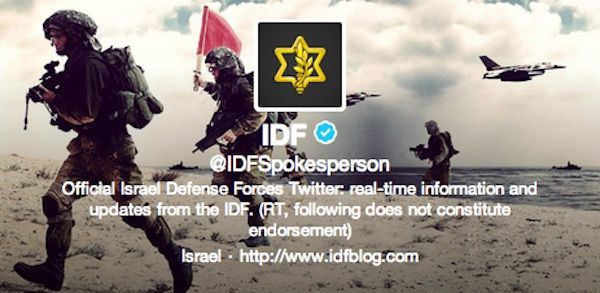In Israel and Gaza Conflict, Twitter is a Key Player

As violence intensifies in the Israel and Gaza conflict, Twitter has been hosting its own battle, with both the Israel Defense Force and Hamas bringing the conflict to a new frontier -- tweeting military moves almost in real-time. Tweeting from @IDFSpokesperson, the Israeli military is sharing photos, satellite images, and military operations aimed at the Gaza Strip. In response, the Hamas military wing, the Al Qassam Brigades, has created the Twitter account @alqassambrigade. This marks the first time in history that a war has been live-tweeted, or even disclosed on the social network.
Explicit in Twitter's policy is the restriction against direct "specific threats of violence against others," which is why some speculate the IDF's Twitter account was suspended for around an hour last night. The IDF was posting live updates on the attacks that had happened in the last 24 hours on the Gaza strip. The tweet speculated to have prompted Twitter officials to suspend the account was captured by the Daily Dot:
YouTube similarly banned a video, uploaded by the IDF, recording the attack which killed Hamas military leader Ahmed Jabari. After calling the removal of the video a "mistake," and putting it back up three hours later, YouTube issued this statement:
“With the massive volume of videos on our site, sometimes we make the wrong call. When it’s brought to our attention that a video has been removed mistakenly, we act quickly to reinstate it.”
Some of the confusion is rooted in the novelty of using social media in military operations. No military force has ever live-tweeted a war before, let alone posted satellite videos and images to update people around the world on specific military maneuvers relating to a conflict.
The two warring factions are using the Internet as a PR weapon, but it is difficult for social media mediators and executives to respond. While most social networks have specific rules against threats or violence, a group's own disclosure of military action becomes a difficult call. Speaking to the challenges of moderating the activity on social networks, social media analyst Benedict Evans told BBC:
“They want to preserve their position as a carrier service that doesn’t editorialize. On the other hand, they have terms and conditions that must be adhered to....This is not a decision a couple of hundred engineers in North California want to be making.”
The IDF faced a difficult media battle after the 2009 Gaza War, and their current social media disclosure could be a reaction to previous experience. With restricted access to the Gaza Strip, journalists often have a difficult time reporting live from the warfront. During the 2009 war, Israel and Egypt refused entrance to foreigners, which led to a confusing array of conflicting reports.
The use of Twitter by both the IDF and Hamas may be an attempt at transparency, providing those reporting on the event insight and information from which to base reports. The Twitter accounts, however, compete to dominate the narrative surrounding the war in a struggle to accurately depict a nuanced, complicated, and often emotional, conflict.
Below are the tweets from both the Israeli military and the Hamas military wing:





